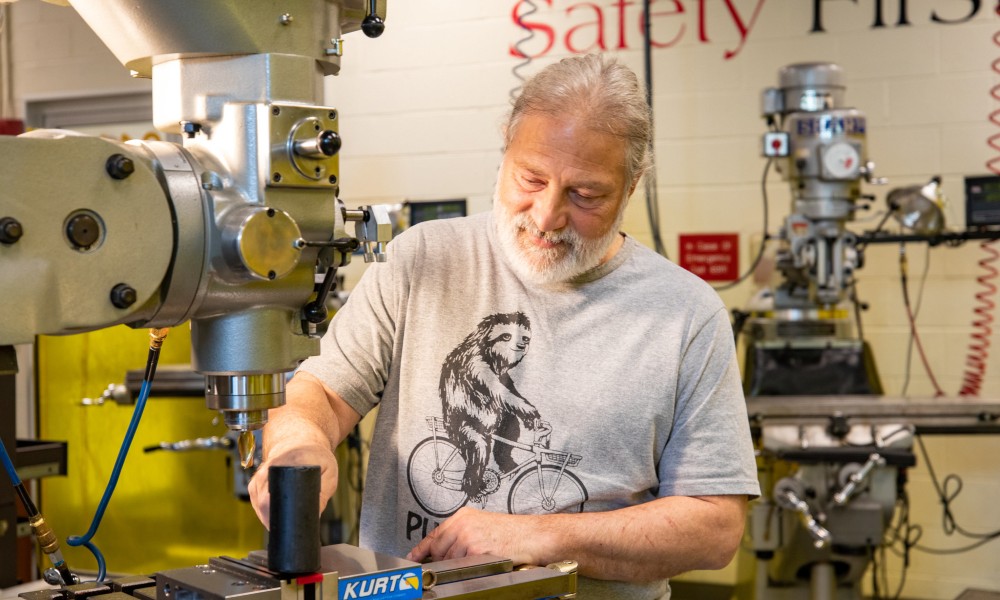Machine Shop pioneer announces retirement
College of Integrated Science and Engineering
SUMMARY: Mark Starnes, who pioneered JMU's Machine Shop, is retiring after 27 years.
By Meghan Long, CISE student writer
Photo: Sarah Hite, CISE photographer
If you have ever planned a big project or needed something built by the Machine Shop at JMU—you probably know Mark Starnes.
Starnes started working with the university in 1995, five years before many of the students he “graduates” with this year were born. He came to JMU after working in the aerospace industry, where he helped put satellites and spaceships into the sky.
Ronald E. Carrier was the university president when Mark began his employment with JMU. At the time, there was no engineering program. Starnes describes how Carrier’s vision to make JMU a “more science-oriented institution” led to the development of a machine shop on campus. With the assistance of Starnes, the first shop was established in the basement of Miller Hall and supported the Integrated Science and Technology (ISAT) Program.
As the university grew, Mark and the Machine Shop grew with it. After negotiating to move the Machine Shop to East Campus, Starnes agreed to open the shops’ services up to all of JMU—not just the sciences. Mark describes how some of his favorite collaborations have been with the departments of “Psychology, Math, English, and Art”, to name a few.
Gray Roisch is a senior engineering student who has worked as an apprentice in the Machine Shop for many years. “We worked on a knife grinding jig for Mark Rooker in the Art Department,” Roisch explains. “That was a project that required multiple pieces and took us four months of actual machining time. It was one of the biggest projects we were able to work on,” he says.
Roisch notes the unique experiences offered to students like him because of Starnes. Apprentices work around 20 hours a week in the Machine Shop—ready to tackle any project that comes their way. “It is always a good time working with Mark,” Gray says. “He is a classical machinist with 30 years of experience and more knowledge than anyone I have ever met. You can come to Mark with any question and he’s able to show you a trick he may have learned 20 years ago that still works today. He is a master at what he does, and it is an honor to learn from someone like him.”
Working with students like Roisch has been Mark’s driving factor throughout his time with JMU. “What gets me up in the morning is being able to work with students,” Starnes says. Starnes’ love for his students led him to start the apprentice program that has taught and employed numerous students. They learn manufacturing and machining through what Mark describes as a “quilt-like pattern.” “It’s rewarding to see students graduate who are dynamic, ambitious, and experienced. I am happy to play a part in that,” he adds.
The trailblazing work that Starnes has brought to JMU is not lost on those around him. Bayo Ogundipe, Department Head and Professor of Engineering, explains what Mark has meant to the university over the years. “The Machine Shop will not be the same without Mark, who built it up and developed the training programs. We plan to continue what he has built and hopefully expand the apprenticeship program in the near future. John Wild, Engineering Lab Manager, will take over the operation of the Machine Shop and the apprenticeship program while we reimagine the role that Mark’s replacement would need to play in our program. These are big shoes to fill.”
Starnes is undoubtedly leaving a lasting legacy on the university. As for what he has planned upon his retirement? Well, the jury is still out on that one. “The misperception with retirement is that it is the end of something. To me, it is just the beginning of something new,” he says.
